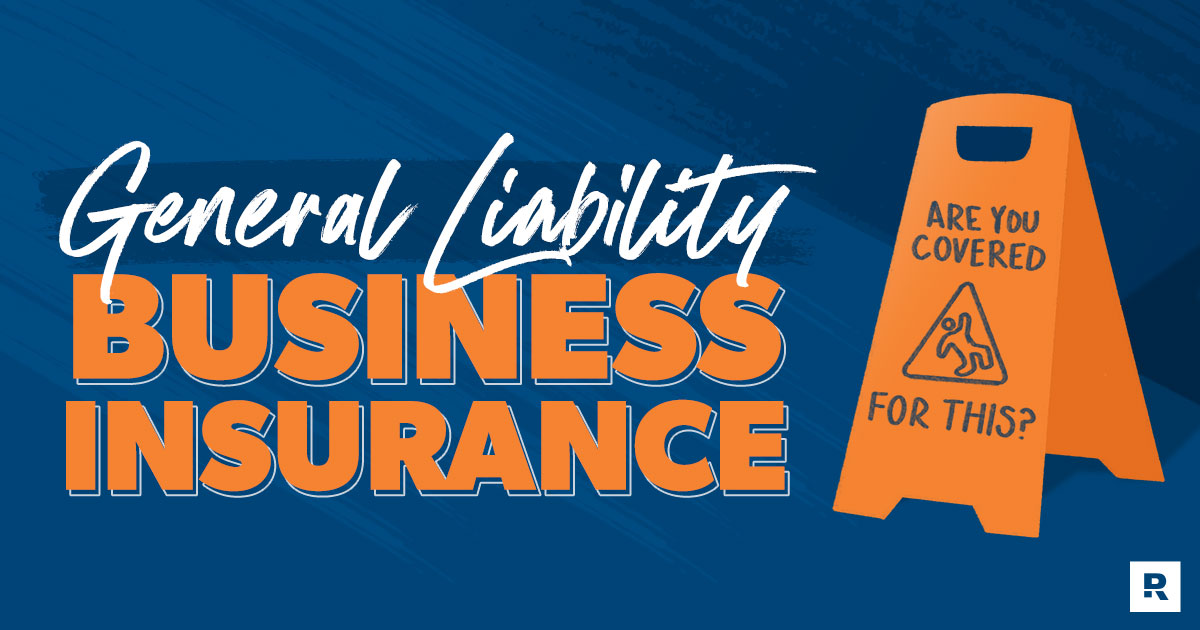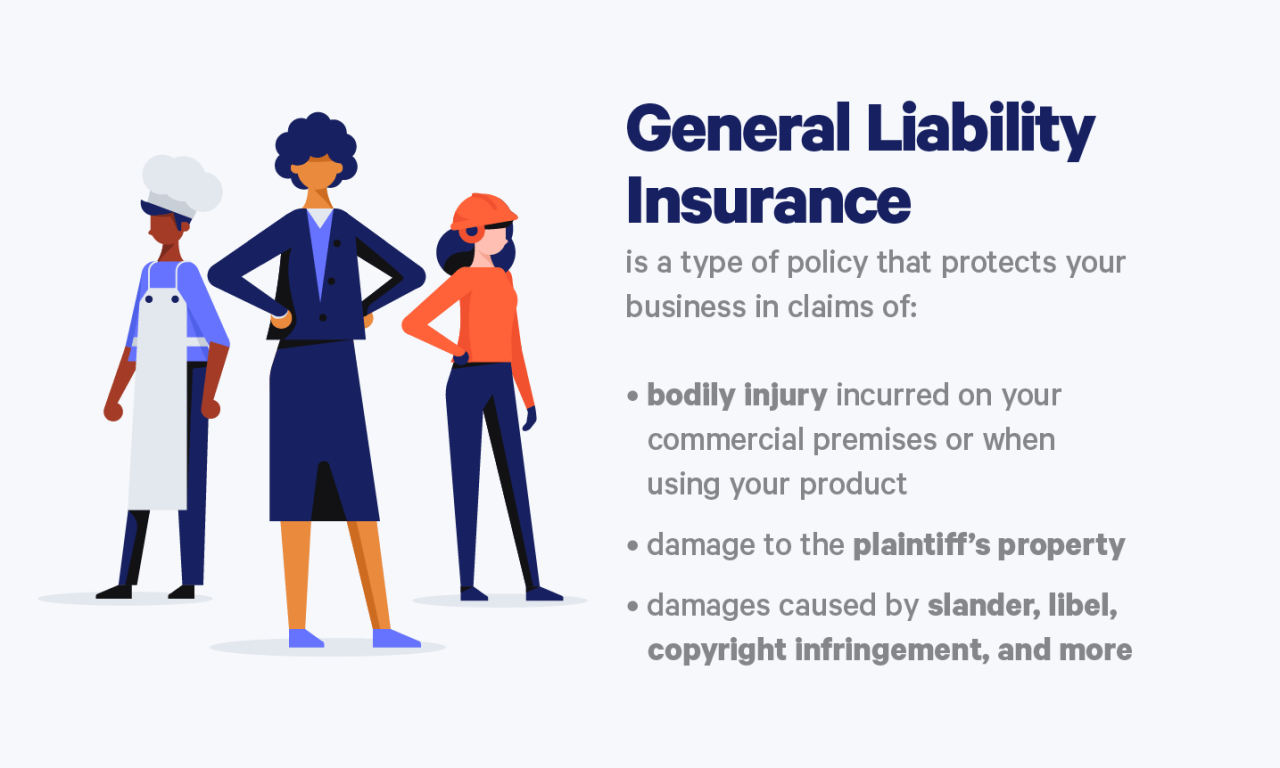Insurance general liability takes center stage, safeguarding businesses and individuals from the unforeseen. This comprehensive coverage shields against financial ruin arising from accidents, lawsuits, and claims, ensuring peace of mind in a world of unpredictable risks.
From slip-and-fall incidents to product liability claims, general liability insurance acts as a safety net, protecting businesses from devastating financial losses. By understanding the key components, benefits, and common scenarios requiring coverage, individuals and organizations can make informed decisions to mitigate potential risks and safeguard their financial well-being.
Definition and Scope of General Liability Insurance
General liability insurance is a crucial component of risk management for businesses and individuals. It provides financial protection against legal and financial liabilities arising from accidents, injuries, and property damage caused by the insured party or their operations. This type of insurance is designed to cover a wide range of potential risks, offering peace of mind and financial stability in the event of unforeseen circumstances.
Types of Risks Covered
General liability insurance policies typically cover a broad spectrum of risks, including:
- Bodily Injury: This covers medical expenses, lost wages, and pain and suffering resulting from injuries caused by the insured’s negligence. Examples include slip-and-fall accidents on the insured’s property, injuries caused by defective products, or injuries sustained during a service provided by the insured.
- Property Damage: This covers the cost of repairing or replacing property damaged by the insured’s negligence. Examples include damage to a customer’s property during a delivery, damage to a building caused by a fire started by the insured, or damage to a neighbor’s property during construction work.
- Personal and Advertising Injury: This covers legal expenses and damages resulting from libel, slander, copyright infringement, or other forms of defamation or invasion of privacy.
- Medical Payments: This covers medical expenses for individuals injured on the insured’s property, regardless of fault. This provision can help avoid legal disputes and demonstrate goodwill towards injured parties.
Examples of Essential Situations
General liability insurance is essential in various situations, including:
- Businesses: Businesses of all sizes face potential liability risks. From small shops to large corporations, general liability insurance is crucial for protecting against lawsuits stemming from customer injuries, property damage, or other incidents related to business operations. For instance, a restaurant may need general liability insurance to cover claims arising from food poisoning or a slip-and-fall accident. Similarly, a construction company would require this coverage to protect against claims arising from accidents on construction sites or damage to neighboring properties.
- Events and Gatherings: Organizing events, whether large-scale concerts or small private parties, carries inherent liability risks. General liability insurance can protect event organizers from claims arising from injuries to attendees or damage to property. For example, a concert organizer would need coverage to address potential claims resulting from a stage collapse or injuries caused by crowd surges.
- Professional Services: Professionals like doctors, lawyers, and accountants often face liability risks related to their services. General liability insurance can protect them against claims of negligence or malpractice. For instance, a doctor may need coverage to address claims related to medical errors, while a lawyer may need coverage to protect against claims of legal malpractice.
- Homeowners: Even homeowners can benefit from general liability insurance. This coverage can protect them against claims arising from injuries to guests or damage to neighboring property. For example, a homeowner may need coverage to address claims resulting from a slip-and-fall accident on their property or damage caused by a tree falling on a neighbor’s house.
Benefits of General Liability Insurance
General liability insurance provides a crucial safety net for businesses and individuals, offering financial protection against various risks that can arise from everyday operations or activities. This type of insurance can help mitigate significant financial losses and legal liabilities, providing peace of mind and allowing individuals and businesses to focus on their core operations.
Protection from Lawsuits and Claims
General liability insurance is designed to protect policyholders from financial losses stemming from lawsuits, claims, and accidents. This coverage can help cover legal defense costs, settlements, and judgments, ensuring that policyholders are not financially crippled by unexpected legal disputes.
- Personal Injury: This coverage protects against claims arising from bodily injury caused by the insured’s negligence. For example, if a customer slips and falls in a store due to a wet floor, the general liability insurance can cover medical expenses, lost wages, and pain and suffering.
- Property Damage: This coverage protects against claims arising from damage to another person’s property caused by the insured’s negligence. For instance, if a contractor accidentally damages a customer’s property while working on a project, the general liability insurance can cover the cost of repairs or replacement.
- Advertising Injury: This coverage protects against claims arising from false advertising, copyright infringement, or other types of intellectual property violations. For example, if a business uses a competitor’s logo without permission, the general liability insurance can cover the cost of legal defense and potential settlements.
Financial Stability and Business Continuity
The financial protection offered by general liability insurance can help businesses maintain financial stability and ensure business continuity. This is especially crucial in the face of unexpected events that could lead to significant financial losses, such as lawsuits or accidents.
“General liability insurance can help businesses avoid bankruptcy or financial ruin by providing coverage for legal expenses, settlements, and judgments.”
Peace of Mind and Risk Mitigation
Knowing that they have general liability insurance can provide businesses and individuals with peace of mind. This peace of mind allows them to focus on their core operations without being constantly worried about potential risks and liabilities. General liability insurance can also help businesses mitigate risk by providing a framework for identifying and managing potential hazards.
- Risk Assessment: The process of obtaining general liability insurance often involves a risk assessment, which can help businesses identify potential hazards and develop strategies for mitigating them.
- Safety Training: General liability insurance providers often offer safety training programs to policyholders, helping them to reduce the risk of accidents and injuries.
- Loss Prevention: By implementing loss prevention measures recommended by the insurance provider, businesses can reduce the likelihood of claims and accidents, leading to lower insurance premiums in the long run.
Real-World Scenarios
- A small bakery owner is sued by a customer who slipped and fell on a wet floor. The general liability insurance covers the legal defense costs, settlement, and medical expenses of the injured customer.
- A contractor accidentally damages a customer’s roof while working on a project. The general liability insurance covers the cost of repairs to the damaged roof.
- A company is sued for copyright infringement after using a competitor’s logo in an advertisement. The general liability insurance covers the legal defense costs and potential settlement.
Common Scenarios Requiring General Liability Coverage
General liability insurance is designed to protect businesses and individuals from financial losses arising from third-party claims related to property damage, bodily injury, or personal and advertising injury. Understanding the common scenarios where general liability coverage is essential can help you determine if this type of insurance is right for you.
Industries and Professions Requiring General Liability Insurance
General liability insurance is crucial for a wide range of industries and professions. The following table highlights some of the key sectors where this type of coverage is commonly required:
| Industry/Profession | Typical Risks | Coverage Requirements | Examples of Claims |
|---|---|---|---|
| Construction | Falling objects, workplace accidents, property damage during construction projects. | High coverage limits, broad coverage for various construction-related risks. | A worker falls from a scaffold and sustains injuries, a construction project damages a neighboring property. |
| Retail | Slip and falls, customer injuries, product liability. | Adequate coverage for customer injuries, product defects, and property damage. | A customer slips on a wet floor and breaks their leg, a faulty product causes injury to a customer. |
| Healthcare | Medical malpractice, patient injuries, negligence. | High coverage limits, specialized coverage for medical errors and malpractice claims. | A doctor misdiagnoses a patient, a nurse administers the wrong medication, a patient falls and sustains injuries while in the hospital. |
| Professional Services | Negligence, errors and omissions, breach of contract. | Coverage for professional liability, errors and omissions, and breach of contract claims. | An accountant makes an error in a financial report, a lawyer provides incorrect legal advice, a consultant fails to meet the terms of a contract. |
| Restaurants and Food Service | Food poisoning, customer injuries, property damage. | Coverage for food-related illnesses, customer injuries, and property damage. | A customer gets food poisoning from contaminated food, a customer slips on a wet floor and breaks their leg, a fire in the kitchen damages the restaurant. |
| Manufacturing | Product defects, workplace accidents, property damage. | Coverage for product liability, workplace accidents, and property damage. | A defective product causes injury to a consumer, a worker is injured in a factory accident, a fire at the manufacturing facility damages neighboring property. |
| Events and Entertainment | Injuries at events, property damage, negligence. | Coverage for injuries to attendees, property damage, and negligence claims. | A concertgoer is injured during a performance, a stage collapses causing property damage, an event organizer is sued for negligence. |
| Real Estate | Property damage, tenant injuries, negligence. | Coverage for property damage, tenant injuries, and negligence claims. | A tenant slips and falls on an icy sidewalk, a pipe bursts causing water damage to a rental property, a landlord is sued for negligence. |
| Transportation | Accidents, cargo damage, property damage. | Coverage for accidents, cargo damage, and property damage. | A truck driver is involved in an accident causing property damage, a shipment of goods is damaged in transit, a delivery driver negligently damages a customer’s property. |
| Education | Student injuries, property damage, negligence. | Coverage for student injuries, property damage, and negligence claims. | A student is injured in a school playground accident, a fire damages a school building, a teacher is sued for negligence. |
Factors Influencing General Liability Insurance Premiums: Insurance General Liability

Insurance companies carefully evaluate various factors to determine the premium for general liability insurance. These factors reflect the potential risk associated with a business, and understanding them can help businesses make informed decisions about their coverage.
Industry, Insurance general liability
The industry a business operates in significantly influences its general liability insurance premium. Some industries are inherently riskier than others. For instance, construction companies face a higher risk of accidents and injuries compared to businesses in the service sector.
- High-risk industries, like construction, manufacturing, and transportation, generally have higher premiums due to the increased likelihood of accidents and injuries.
- Low-risk industries, such as retail or consulting, typically have lower premiums because they pose a lower risk of claims.
Business Size
The size of a business is another key factor in determining premiums. Larger businesses often have higher premiums because they typically have more employees, a larger customer base, and a wider range of operations.
- Large businesses, with numerous employees and operations, are more likely to face lawsuits or claims, leading to higher premiums.
- Small businesses with fewer employees and limited operations usually have lower premiums due to their lower risk profile.
Location
The location of a business also impacts its general liability insurance premium. Some areas have higher rates of crime, accidents, or natural disasters, which can increase the risk of claims.
- Businesses located in urban areas with high crime rates or dense populations might have higher premiums due to the increased likelihood of accidents or injuries.
- Businesses in rural areas with lower population density and lower crime rates generally have lower premiums.
Risk Profile
The specific risks associated with a business’s operations are crucial in determining premiums. Factors such as the nature of the work, the use of hazardous materials, and the frequency of customer interactions all contribute to the overall risk profile.
- Businesses that handle hazardous materials, engage in high-risk activities, or have frequent customer interactions might have higher premiums due to the increased potential for claims.
- Businesses with low-risk operations, minimal use of hazardous materials, and limited customer interactions usually have lower premiums.
Understanding Policy Exclusions
General liability insurance policies, while designed to provide comprehensive coverage, are not all-encompassing. They contain exclusions, which are specific circumstances or situations where coverage is explicitly denied. These exclusions are crucial to understanding the limits of your policy and ensuring you have adequate protection.
Common Exclusions in General Liability Policies
Policy exclusions are designed to protect insurance companies from covering certain risks that are considered too high, unpredictable, or outside the scope of standard business operations. Here are some common exclusions found in general liability insurance policies:
- Intentional Acts: Coverage typically does not extend to injuries or damages caused intentionally by the insured or their employees. For instance, if a business owner intentionally assaults a customer, the general liability policy won’t cover the resulting damages.
- Professional Services: General liability policies often exclude coverage for injuries or damages arising from professional services provided by the insured. This typically applies to professionals like doctors, lawyers, accountants, and engineers, who require specialized professional liability insurance.
- Environmental Contamination: General liability policies generally exclude coverage for environmental damage caused by the insured’s operations. For example, if a company’s activities contaminate the soil or groundwater, the policy may not cover the resulting cleanup costs.
- Employee Injuries: General liability policies typically do not cover injuries sustained by the insured’s employees. These injuries are typically covered under workers’ compensation insurance.
- Contractual Liability: Coverage may be excluded for liabilities arising from contracts that the insured has entered into. For example, if a contract includes a clause where the insured assumes liability for a particular risk, the general liability policy may not cover that risk.
Impact of Exclusions on Coverage
Policy exclusions can significantly impact coverage by limiting the situations where the insurance company will pay for claims. Understanding these exclusions is essential for businesses to:
- Identify potential gaps in coverage: By understanding the limitations of their general liability policy, businesses can identify areas where they might need additional insurance coverage.
- Avoid costly claims: Knowing the exclusions can help businesses avoid actions or activities that could lead to claims that are not covered by their policy.
- Negotiate policy terms: Businesses can use their understanding of exclusions to negotiate with insurance companies for broader coverage or more favorable terms.
Examples of Coverage Denials Due to Exclusions
Here are some examples of situations where coverage might be denied due to policy exclusions:
- A business owner intentionally sets fire to their own property to collect insurance money. This act would be excluded from coverage because it is intentional and fraudulent.
- A doctor makes a medical error that causes a patient’s death. This incident might be excluded from coverage under the professional services exclusion, as it falls under the realm of medical malpractice.
- A manufacturing company discharges toxic chemicals into a nearby river, causing environmental damage. The policy may exclude coverage for this incident under the environmental contamination exclusion.
- An employee is injured while performing their job duties. This injury would typically be covered by workers’ compensation insurance, not the general liability policy.
- A business agrees in a contract to assume liability for any accidents that occur on a construction site. This liability may be excluded from coverage under the contractual liability exclusion.
Final Summary

In conclusion, insurance general liability stands as a cornerstone of risk management, providing a crucial layer of protection for businesses and individuals. By understanding the intricacies of this coverage, businesses can navigate the complexities of potential liabilities, minimizing risks and fostering a secure environment for growth and success.
Insurance general liability is a vital component of risk management, protecting businesses from financial losses arising from third-party claims. Direct general insurance, such as direct general insurance , can provide this crucial coverage. By understanding the scope of general liability insurance, businesses can effectively mitigate potential risks and ensure their continued operations.
